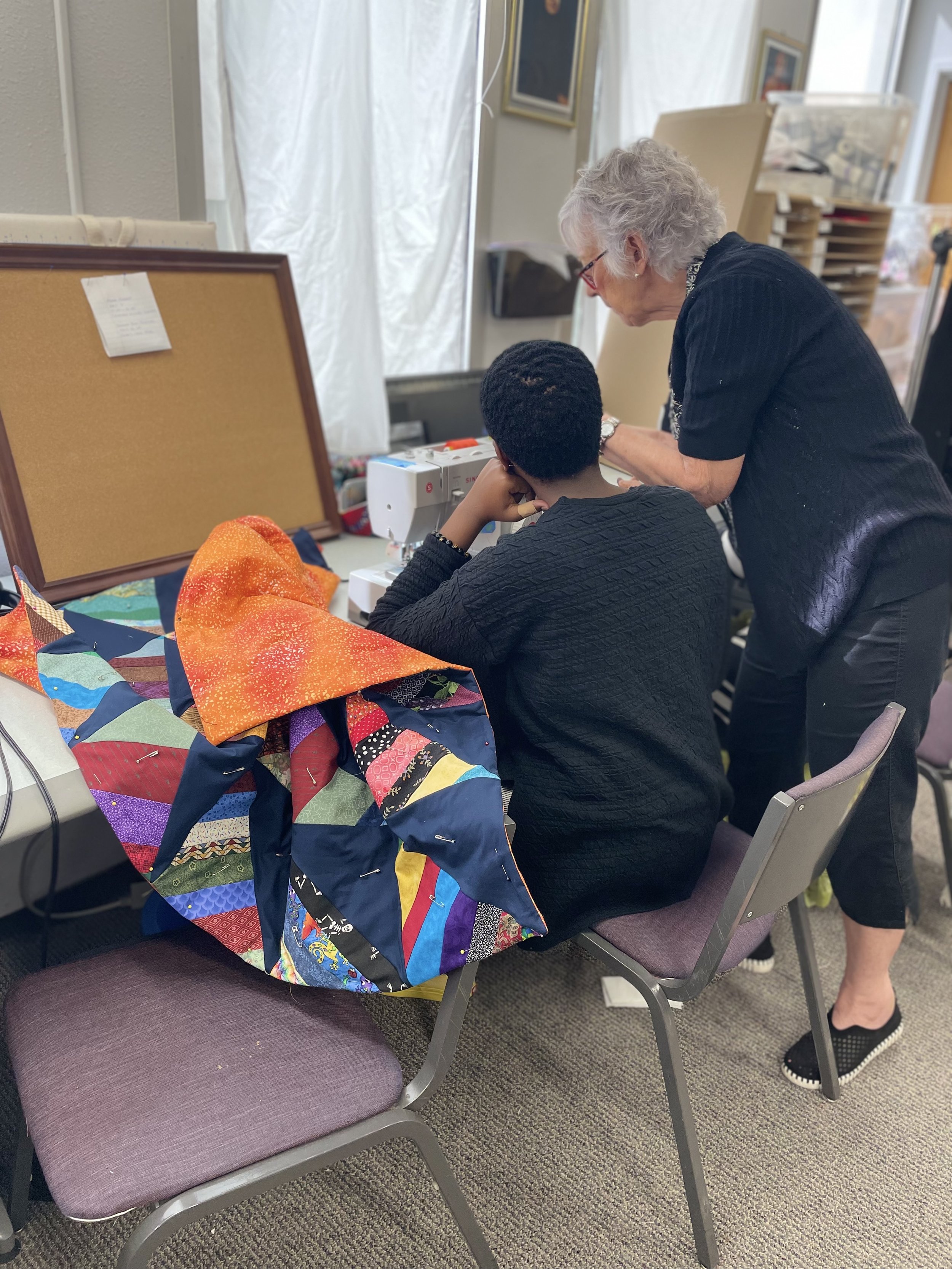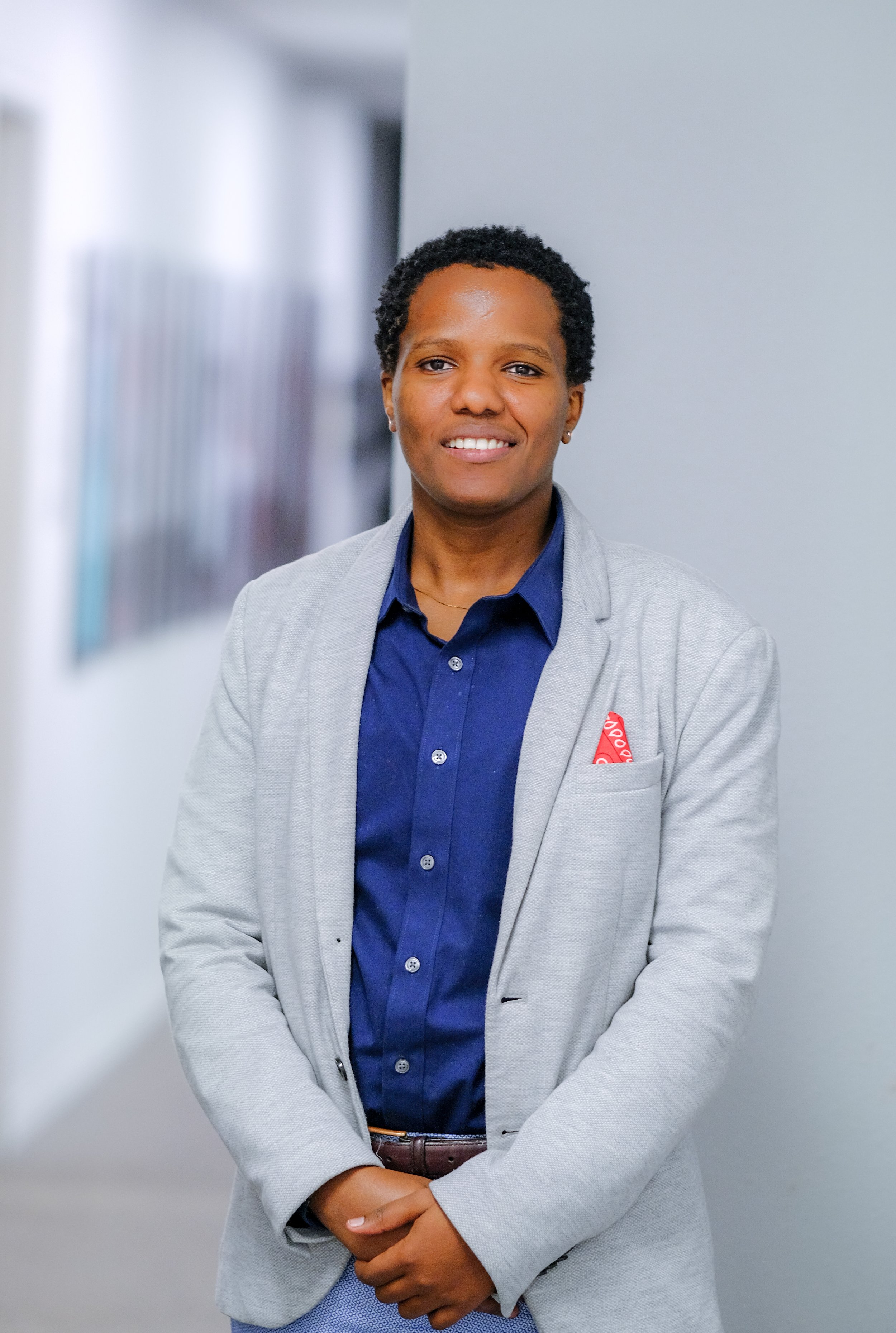Sewing, Patience and Non-Binary Fashion: 'We Made This' Impact Spotlight
Written by Julia Leone, Communications Intern
“And we do understand each other, regardless of the language barrier. Having to get your phone out and look for Google Translate, putting in the effort of trying to understand another human being, that is one of the kindest things that anyone can ever do. ”
Last month, I was fortunate enough to sit down with Lom, a 25 year old refugee from Uganda. This interview was a long-time coming; one of my biggest interests when interviewing at ACC was the prospect of working directly with our refugee community members to share their many diverse stories. We sat down together, primarily to discuss Lom’s participation in ACC’s We Made This program, which is a therapeutic arts & sewing program for refugees. Participants attend weekly classes for a 12-week period and their creations are then sold at craft fairs and markets; participants receive a portion of the sale. Those who are successful in completing the entire program then receive their own free sewing machine to take home and continue their new craft.
Outside of the We Made This program, Lom has a long history of being a committed LGBTQ+ activist. Born in Uganda, they were forced to flee their home country over serious fears for their life after the Ugandan government passed the ‘Kill the Gays’ bill. In their asylum country, Kenya, their experiences motivated them to co-found a non-profit organization advocating for equality for LGBTQ+ individuals: Women for Women Africa. They have also worked alongside other organizations, Church World Service and the Hebrew Immigrant Aid Society, in order to advocate for more robust and comprehensive reproductive health rights for refugees. While they are no longer in Nairobi, they still play an active role in the organization; working to create safe shelter for LGBTQ+ youth in Kenya.
Lom is also a new speaker with the Colorado Refugee Speakers Bureau; a local organization that promotes multicultural exchange and understanding through the powerful art of storytelling. Speakers can be requested for various events through the website.
The following interview has been edited for readability and clarity.
Q: To start off, will you tell me your name, how old you are and where you’re from?
L: You can call me Lom. I was originally born in Uganda, but I had been in Nairobi more than I can remember. Kenya was my country of asylum. My age? I’m 25 years old.
Q: When did you come to the United States?
L: August…, August 4th of this year, 2022.
Q: Why did you make the decision to leave Uganda?
L: It wasn’t safe, not for people like me. It’s not safe, even now. I’ve seen a couple of my friends get killed, die. And I never wanted to be one of them.
Q: What do you mean, people like you?
L: LGBTQ people, as long as you’re LGBTQ. There’s a Kill Bill for LGBTQ people sadly.
Q: Since coming to the US, how has ACC supported your integration?
L: Well, first of all, for all the time I spent In Nairobi, I’m grateful that I ended up in ACC’s hands. They [ACC] received me, good people. I’ve met amazing people, connected, I feel like I’ve been part of a family here and ACC has helped me settle in. So far, so great. The Match Grant guys are really great, the We Made This program is amazing. Getting to see and getting to do things without the fear of, you know, maybe being in the wrong space, it’s a good feeling.
Q: I can only imagine how refreshing it must be, to finally feel free to be yourself without fear. You mentioned the Match Grant program and the We Made This program, what services have you been provided through ACC?
L: Resettlement, that’s the main service that ACC has provided. But, Match Grant, from what I know, is a government organization. They’ve been able to help me find a job; seeking out job fairs. They got me a bike, which has really been so helpful, especially now that it’s cold out and all that. They’ve even been able to help me financially as I settle in, paying my bills and for housing and stuff. It’s given me time to figure out how to become stable. My team is a group of guys that are really supportive, they push me to actually get out there and get what I want. They’re empowering.
Q: In your own words, how would you describe the We Made This program?
L: To me, it’s a space where everybody is welcome to make, learn, meet new people and understand new cultures. It’s magic. Mainly, it’s actually seeing magic come to life. I had an idea about what sewing was before, but it was the first time I actually started sewing. Seeing something come out of nothing, it comes with some kind of joy.
Q: You mentioned you had never sewed before, so what drew you to the We Made This program?
L: Oh yea, I’m an artist. I sketch and I paint sometimes, so there have always been a few designs I wanted to create, but I never knew the art of tailoring. But these design ideas, I know they can be beneficial to my community, like the LGBT community back in Nairobi and I believe even worldwide. I always wanted the ability to produce a piece of my own and put it out there. So, that’s what pushed me to actually learn how to sew.
Q: You mention giving back to your community through your designs, how do your designs do that? What do you want someone in your community to get out of your designs?
L: First, I still need to learn how to truly make my designs. How am I giving back to the community? I believe that I know what my community needs, the clothing designs I have, some of them are non-binary clothes and non-binary wear. It’s literally not encaged in any manner by cisgender norms, anyone can put it on. I believe my creations can put our community forward.
Q: That’s super interesting. I’ve been seeing a lot lately, of the challenges that come with creating non-binary fashion, how people can struggle with dismantling these really deeply imbedded social notions of gender, especially in clothing.
Q: Do you find the We Made This program to play a big part of your life?
L: Well at first, I just wanted it to be a hobby, I could sit behind a machine and make clothes just for fun. But right now, I can say that I’ve learned a lot by being around the women in the program. I’ve learnt so much. They’ve all taught me so much from different backgrounds. I wouldn’t say it’s such a huge part of my life, but it has played a very big part in how I see people and understand life itself.
Q: What’s the most important thing you’ve learned in the program?
L: Patience. When we first started, Tin Tin, my teacher, was giving us pieces of paper with dotted lines and when you’re sewing these pieces of paper it makes you think like, ‘man, I came here to sew clothes, why am I sewing on pieces of paper?’ The whole process, the entire process, is patience. That’s the main thing the program has taught me, the outcome is really amazing.
Q: What do you like the most about the program?
L: Mainly, I enjoy actually getting to create something new each day.
Q: How often are you coming to class? And do you start a new project each day or is the schedule more loose?
L: I come twice a week to the program. And the project time varies each time, if you finish early you can move on, but if it takes long, you have to get it right.
Q: What’s your favorite project that you’ve completed?
L: Well, one piece I was a part of creating, that I loved, are the quilts. All other people’s pieces are put onto one. Getting to see my piece, some of my pieces on that quilt, makes me feel good, makes me feel like I’m part of something big, you know?
[It’s a beautiful quilt.]
Q: What would you say to another refugee individual who is interested in the program, but isn’t sure they want to join?
L: I think I would say, We Made This is a great space for everybody. It’s a place where any refugee can be themselves and feel free and feel cared for. It’s a place where you can find the help you need and when you want it, you’ll always get it. They helped me with getting my state ID, made it easier. They gave me directions to a dentist when I had a bad tooth. You know, the simple things that when you’re alone are hard; so many refugees come here with families, but even if you didn’t come with a family, this feels like a family.
Q: The way the program is advertised, it seems like the program is just a class. You come, learn and go home. But from what you’ve described it really sounds like more of a community. You guys are becoming a family, not just learning skills. Do you have anything else you’d wanna say about that community, this family that’s being built here?
L: Well, I don’t speak the same language as most of the women here. But it’s just amazing getting to figure out how to communicate with them. And we do understand each other, regardless of the language barrier. Having to get your phone out and look for Google Translate, putting in the effort of trying to understand another human being, that is one of the kindest things that anyone can ever do.
Q: We need more of that in the world, it can be so simple as taking your phone out and going on Google Translate to connect to someone, and sometimes people aren’t even willing to do that.
Q: Is there anything else, about your story or ACC that we haven’t talked about that you’d like to share?
L: Well, what could I say? I have an organization that I run in Nairobi: Women for Women Africa. It’s an organization to support female born and female identifying individuals.
Q: And this organization, this is something you still run from here?
L: Yes, and Match Grant, I forgot to mention that they gave me a laptop. It’s really helped with my work, working back in Nairobi with the time zones and schedules, a laptop has been so helpful.
I also would compliment, among any of the people I know who came to the States before me, my friends and those I know, they all complain about their [resettlement] agencies, but I’m proud of mine. I’ve loved my experience with ACC. From what I’ve heard about different agencies that receive refugees and stuff, most of my friends have all these complaints about their agencies not being very great and not being there for them, but I would say I am satisfied.
During my interview process, I was drawn to ACC because of our mission statement and values. I too, was committed to fostering multicultural exchange and creating a community and state where refugees felt not just welcomed, but active members of the community. Hearing Lom share his experiences and see that ACC’s mission and values aren’t just words on paper, meant a lot to me. I’m proud to work at a company where our people can be proud of us.
If you or anyone you know are interested in the We Made This program, please reach out to sahar@acc-den.org.


